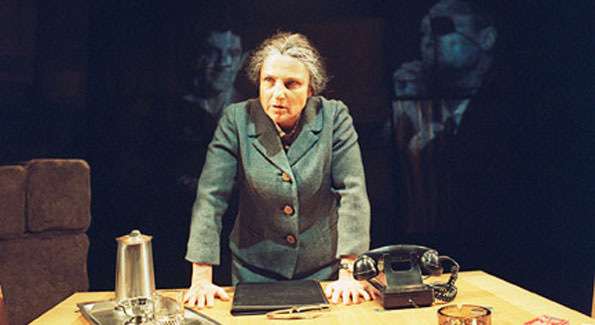REVIEW: Tovah Feldshuh delivers powerful one-woman show in ‘Golda’s Balcony’ at Theater J.
Former Israeli Prime Minister Golda Meir once sarcastically observed: “We Jews have a secret weapon in our struggle against the Arabs; we have no place to go.”
An important figure in the turbulent history of Israel, Golda was singularly focused and committed. That formidable woman is portrayed brilliantly and believably by Tovah Feldshuh in the one-woman “Golda’s Balcony” at Theater J. Feldshuh is Golda in William Gibson’s smart, evocative script carefully focusing on the woman who became the fourth prime minister of Israel and then only the third woman in the world to hold that powerful position. She was known as the Iron Lady long before British Prime Minister Margaret Thatcher.
Born in Russia and reared in Milwaukee where her father moved his family to escape the Cossack pogroms, she was a Zionist at a time when few knew the definition of the word. She had early dreams of a Jewish homeland and convinced her reluctant husband to move to Palestine in 1921 to live on a kibbutz, when there were few Jews in that Arab land.
Feldshuh humanizes Golda as a real, complex woman, impressive and flawed.
Feldshuh, an actor with staggering theatrical credentials, performed the one-woman show on Broadway for 493 performances, where it was a smash hit, making it the longest one-woman show in Broadway history.
It is understandable why “Golda’s Balcony” was such a hit. One-person productions are challenging to stage and it takes a larger-than-life actor and a sensitive script to carry it off. Hal Holbrook appeared at the National Theatre recently in his familiar Mark Twain interpretation, and at 89, still commands the stage. Feldshuh is in the Holbrook category — for 90 uninterrupted minutes, she is Golda Meir.
Golda was obsessed with a Jewish homeland.
Portraying Golda shortly before her death at 80 in 1978, Feldshuh reveals a leader who was there at the creation of Israel and was so obsessed with the preservation of the young nation that it became more important than her marriage or her two children. Israel was her child. Golda may have been a disappointment as a wife and mother, but like many other major figures who walk onto the historic stage at times of conflict and danger, she was a giant of her time.
The time period Gibson has set for Golda’s reflection is during the 1973 Yom Kippur War when Israel was surrounded by an invading coalition of Arab states led by Egypt and Syria. Feldshuh takes the ill, heavy-smoking Golda through the complex dilemma of fearing that with inadequate armaments she will have no choice but to use nuclear weapons, with the knowledge that in doing so she could set off World War III. A frustrated Golda, with nowhere to turn but the United States, nags a wavering and reluctant Henry Kissinger into convincing President Nixon to supply Israel with armaments. Kissinger doesn’t fare well in Gibson’s thoughtful and witty script. The title of the play refers to the nickname given to an area inside the top-secret, underground Dimona facility where nuclear weapons were developed.
Meir was so frequently seen there that it earned the name.
Scott Schwartz, the production consultant and original Broadway director, has staged Feldshuh’s performance so that there is never a superfluous or static movement. Feldshuh is always in control and we are a part of the reflective final days of a life well lived by a brilliant, but flawed Golda.
That she is dying is only another fact of her life.
Feldshuh’s interpretation is a provocative performance.
It honors the steely woman who anticipated and was there at the creation of a new nation, and was determined to stand her ground because there was no place to go.
“Golda’s Balcony” continues through April 27 at Theater J, 1529 16th St. NW. Tickets are $50-$85 and are available at 800-494-8497 and online here.





